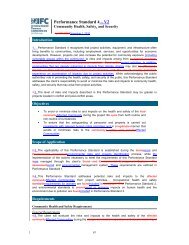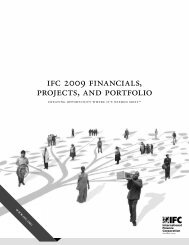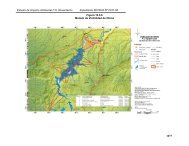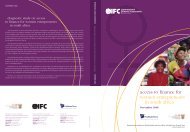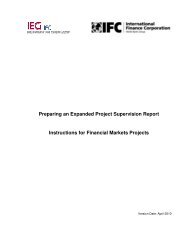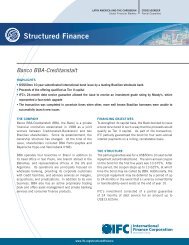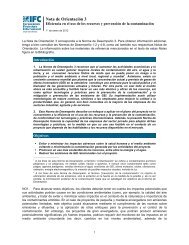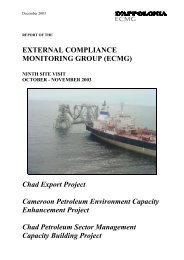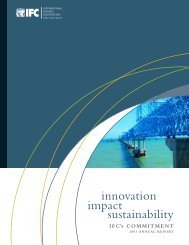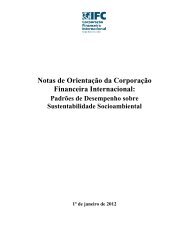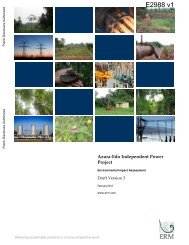Corporate Governance for Banks in Southeast Europe: Policy - IFC
Corporate Governance for Banks in Southeast Europe: Policy - IFC
Corporate Governance for Banks in Southeast Europe: Policy - IFC
Create successful ePaper yourself
Turn your PDF publications into a flip-book with our unique Google optimized e-Paper software.
A3. Tra<strong>in</strong><strong>in</strong>g 20<br />
F<strong>in</strong>d<strong>in</strong>g board talent is hard enough <strong>in</strong> countries with<br />
long traditions of professional board governance. The<br />
task is even harder <strong>in</strong> SEE, where the local bank<strong>in</strong>g<br />
sector has been <strong>in</strong> a stage of rapid development and<br />
where opportunities to learn from experience have<br />
been limited. Tra<strong>in</strong><strong>in</strong>g is the pr<strong>in</strong>cipal solution to this<br />
dearth of knowledge. Most SEE board members need<br />
additional tra<strong>in</strong><strong>in</strong>g to become fully effective.<br />
Tra<strong>in</strong><strong>in</strong>g can be divided <strong>in</strong>to two broad categories: 1) <strong>in</strong>duction tra<strong>in</strong><strong>in</strong>g; and 2) ongo<strong>in</strong>g tra<strong>in</strong><strong>in</strong>g. Induction<br />
tra<strong>in</strong><strong>in</strong>g is the most commonly provided learn<strong>in</strong>g opportunity <strong>for</strong> board members. It is, <strong>in</strong> fact, less a tra<strong>in</strong><strong>in</strong>g<br />
exercise than an <strong>in</strong>troduction to the bank. It usually <strong>in</strong>cludes visits to bank sites, brief<strong>in</strong>gs from bank executives,<br />
and the provision of <strong>in</strong><strong>for</strong>mation manuals and other documentation. Induction tra<strong>in</strong><strong>in</strong>g helps board members<br />
get up to speed quickly. In all likelihood, <strong>in</strong>duction tra<strong>in</strong><strong>in</strong>g will not help board members fill gaps <strong>in</strong> their<br />
qualifications but it is essential <strong>for</strong> gett<strong>in</strong>g an understand<strong>in</strong>g of the key players and structure of the bank.<br />
More specific ongo<strong>in</strong>g tra<strong>in</strong><strong>in</strong>g opportunities are typically needed to respond to the needs of banks.<br />
For example, tra<strong>in</strong><strong>in</strong>g <strong>in</strong> risk management, f<strong>in</strong>ance, account<strong>in</strong>g, and other topics may provide important<br />
bank-specific skills, and more technical knowledge of corporate governance practices and the roles and<br />
responsibilities of board members would also be useful. In the area of governance, board members need<br />
to develop a better understand<strong>in</strong>g of why conflicts of <strong>in</strong>terest are bad, and they need to learn how to be<br />
more assertive, more <strong>in</strong>dependent, and more articulate. Although such basic knowledge and skills may be<br />
widely available <strong>in</strong> developed f<strong>in</strong>ancial markets, they tend to be less prevalent <strong>in</strong> markets <strong>in</strong> earlier stages of<br />
development (see Chart 1).<br />
Chart 1: Requirements <strong>for</strong> and Monitor<strong>in</strong>g of Tra<strong>in</strong><strong>in</strong>g and Induction <strong>in</strong> SEE<br />
The Need <strong>for</strong> Education and Tra<strong>in</strong><strong>in</strong>g<br />
“We would like to recommend to the<br />
banks and the regulators tra<strong>in</strong><strong>in</strong>g<br />
courses <strong>for</strong> executives and non-executive<br />
directors, because this was a crisis<br />
of knowledge and competence.”<br />
Bistra Boeva, Bulgaria<br />
Do supervisory authorities require and/or monitor the <strong>in</strong>duction and tra<strong>in</strong><strong>in</strong>g of new directors?<br />
NO<br />
YES<br />
0 10% 20% 30% 40% 50% 60% 70% 80%<br />
Source: Data from EBRD, <strong>Corporate</strong> <strong>Governance</strong> Assessment of <strong>Banks</strong> (2010–2011). Question asked to regulators <strong>in</strong> the region.<br />
How to provide the needed tra<strong>in</strong><strong>in</strong>g is a major challenge. Institutes of directors can provide tra<strong>in</strong><strong>in</strong>g <strong>in</strong><br />
areas that are of importance to the region, such as risk management, <strong>in</strong>ternal control, and <strong>in</strong>ternal audit,<br />
and they can play an important role <strong>in</strong> creat<strong>in</strong>g a pool of competent board members, as can academia,<br />
20 2010 BIS Pr<strong>in</strong>ciples, Section III.A, p. 10.<br />
<strong>Corporate</strong> <strong>Governance</strong> <strong>for</strong> <strong>Banks</strong> <strong>in</strong> <strong>Southeast</strong> <strong>Europe</strong> <strong>Policy</strong> Brief 15



